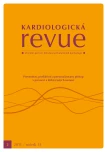-
Medical journals
- Career
Individualized therapy of arterial hypertension
Authors: B. Nussbaumerová; H. Rosolová
Authors‘ workplace: Centrum preventivní kardiologie, II. interní klinika LF a FN v Plzni, UK Praha
Published in: Kardiol Rev Int Med 2011, 13(2): 92-95
Overview
Purely lowering blood pressure is not sufficient in up-to-date antihypertensive treatment. Certain antihypertensive drugs should be used in specific patient groups according to evidence-based medicine. The treatment should be individualized according to the risk and presence of vascular complications, concomitant diseases and life expectancy as the treatment method determined based on the patient’s individual needs is vital for the patient’s future.
Keywords:
arterial hypertension – individualized therapy – cardiovascular prevention
Sources
1. Widimský J Jr, Cífková R, Špinar J et al. Doporučení diagnostických a léčebných postupů u arteriální hypertenze – verze 2007. Doporučení České společnosti pro hypertenzi. Vnitř Lék 2008; 54 : 101–110, 112, 114–118.
2. 2007 Guidelines for the Management of Arterial Hypertension. The Task Force for the Management of Arterial Hypertension of the European Society of Hypertension and of the European Society of Cardiology. Guidelines Committee. J Hypertens 2007; 25: 1105–1187.
3. Mancia G, Laurent S, Agabiti-Rosei E et al. Reappraisal of European guidelines on hypertension management: a European Society of Hypertension Task Force document. J Hypertens 2009; 27: 2121–2158.
4. The ACCORD Study Group. Eff ects of Intensive Blood-Pressure Control in Type 2 Diabetes Mellitus. N Engl J Med 2010; 362 : 1575–1585.
5. Arima H, Chalmers J, Woodward M et al. PROGRESS Collaborative Group. Lower target blood pressure are safe and eff ective for the prevention of recurrent stroke: the PROGRESS trial. J Hypertens 2006; 24: 1201–1208.
6. Heart Outcomes Prevention Evaluation (HOPE) Study Investigators. Effects of ramipril on cardiovascular and microvascular outcomes in people with diabetes mellitus: results of the HOPE Study and MICRO-HOPE substudy. Lancet 2000; 355 : 253–259.
7. Brenner BM, Cooper ME, de Zeeuw D et al. Effect of losartan on renal and cardiovascular outcomes in patients in type 2 diabetes and hypertension. N Engl J Med 2001; 345 : 861–869.
8. The ONTARGET Investigators. Telmisartan, Ramipril, or Both in Patients at High Risk for Vascular Events. N Engl J Med 2008; 358 : 1547–1559.
9. Ruggenenti P, Fassi A, Ilieva AP et al. Prevention of microalbuminuria in patients with type 2 diabetes mellitus – the BENEDICT study. N Engl J Med 2004; 351 : 1941–1951.
10. De Luca A, Izzo R, Fontana D et al. Haemodynamic and metabolic effects of rilmenidine in hypertensive patients with metabolic syndrome X. A double blind paralel study versus amlodipine. J Hypertens 2000; 18: 1515–1522.
11. Widimský P, Hlinomaz O, Kala P et al. Diagnostika a léčba akutního infarktu myokardu s elevacemi ST. Doporučení České kardiologické společnosti 2009. Cor Vasa 2009; 51 : 724–740.
12. Beckett NS, Peters R, Fletcher AE et al. HYVET Study Group. Treatment of hypertension in patients 80 years of age or older. N Engl J Med 2008; 358: 1887−1898.
Labels
Paediatric cardiology Internal medicine Cardiac surgery Cardiology
Article was published inCardiology Review

2011 Issue 2-
All articles in this issue
- Prediction and prevention of cardiovascular risk of obesity, personalized obesity treatment
- Prediction and prevention of atherosclerosis and personalized treatment of dyslipidemia
- Prediction and prevention of diabetes mellitus type 2
- Individualized therapy of arterial hypertension
- Tabacco smoking and personalized approach in prevention and treatment
- ROCKET AF study – Is the end of warfarin coming?
- Patients with high cardiovascular risk in outpatient care in Slovakia: lessons from the NEMESYS and STAIRS studies
- Thrombosis of mitral annulus as an early complication following mechanical replacement of mitral and aortal valves: case report
- A case of atypical heart failure
- Cardiology Review
- Journal archive
- Current issue
- Online only
- About the journal
Most read in this issue- Prediction and prevention of atherosclerosis and personalized treatment of dyslipidemia
- Individualized therapy of arterial hypertension
- Prediction and prevention of diabetes mellitus type 2
- A case of atypical heart failure
Login#ADS_BOTTOM_SCRIPTS#Forgotten passwordEnter the email address that you registered with. We will send you instructions on how to set a new password.
- Career

